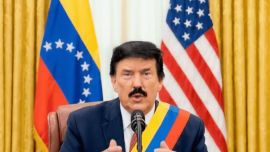The Congress vote in midweek to impose its own mechanism for updating pensions raises new doubts as to who is running this country, as the money markets have been quick to spot. President Javier Milei was even quicker to promise an executive branch veto in defence of his fiscal surplus, which would normally be end of story were it not for the size of that Congress vote – 162 votes to 72 comfortably exceeds the two-thirds majority needed to override a presidential veto with every chance of that margin being repeated in the Senate. But nor can anybody walk away with the conclusion that Argentina now has a new master because of the extreme fragmentation of a Congress where almost half the deputies are neither libertarian nor Kirchnerite.
Instead of a parliament in rebellion against the monarch, as occurred in England almost four centuries ago, what we have here is a circumstantial majority because of the extreme social sensitivity of battered pensions taking the brunt of Milei’s austerity – whether that two-thirds consensus can be replicated over other issues so that Congress can start calling the shots is another question entirely. And if the battleground between executive and legislative branches lies in public opinion, it is hard to see where that will shift. Milei’s general approval ratings still hover around the 56 percent of last November’s run-off triumph because of the hope of a different future he uniquely continues to raise but that almost invariably changes when it comes to specific issues with pensions certainly no exception.
Nor was the tweak given by Congress to the pension updating mechanism an orgy of populism in its final version – it injected January’s 20.6 percent inflation into the formula but did nothing to redress the damage done to the retired by the 25.5 percent inflation of a December divided between two presidential terms. On that point it might be said in fairness to a heartless libertarian government that all the erosion suffered by pensions until now has been the fault of the updating mechanism of the Frente de Todos administration headed by Alberto Fernández which ignored inflation, leaving retirement benefits at three-quarters of their real value at the end of that presidency – the Kirchnerite bill proposed repairing all the damage done by their own government (at a cost of around two percent of Gross Domestic Product) but they were obliged to fall in line behind the more modest initiative spearheaded by Radicals and moderate Peronists.
Yet pensions are not the only sensitive social issue and nor is Congress the only delicate front of a government in permanent disarray with chaos almost a matter of anarcho-capitalist principle. The turmoil in the Human Capital Ministry over the millions of kilos of soup kitchen food withheld in government warehouses (with the feeble excuse of being potential emergency relief) keeps the government on the hop despite the change of Cabinet chief although it is the tip of an iceberg, distracting attention from much bigger issues. More important are the major cuts in poor relief in general on the pretext of picket rackets with the end always justifying the means in the form of defending a somewhat contrived fiscal surplus.
Thus far the tussles between the executive and legislative branches of government do not amount to more than indecisive skirmishes which do not measure up to the scale of the problems. A complete overhaul of both the pension and welfare systems is required which can never be synonymous with their demolition. In the case of the former, ending corporate privileges and bogus invalid pensions would improve the situation without being sufficient in the face of the demographic trends of today’s world with ageing populations and declining birth rates – the retirement age needs to be raised with no guarantee of sufficing. Whether a libertarian government bolstered by the youth vote and with eyes to the future has the political will to do anything for pensions other than making their erosion a major contribution to a fiscal surplus is open to doubt although this week’s Congress vote indicates that it might not be their decision. Reversing the relentless impoverishment of Argentina in recent decades will take more than changing who runs the soup kitchens – either an economic revolution bringing in productive investment creating real jobs (two things which do not always go together) with massive improvements in productivity or an acceleration into a future of artificial intelligence with a universal basic income. With who makes those decisions still up in the air.


















Comments